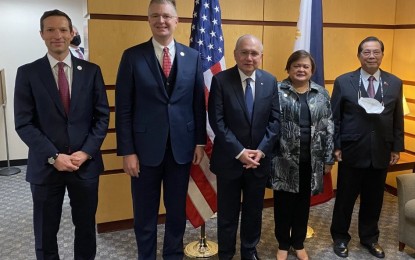
(From left) Assistant Secretary of Defense for Indo-Pacific Security Affairs Ely Ratner, Assistant Secretary of State for East Asian and Pacific Affairs Daniel Kritenbrink, Philippine Ambassador Jose Manuel Romualdez, Foreign Affairs Undersecretary for Bilateral and Asean Affairs Ma. Theresa Lazaro, and Defense Undersecretary Cardozo Luna. (Photo courtesy of US Embassy in the Philippines)
MANILA – The United States and Philippine governments are looking at enhancing their alliance to address new and emerging challenges, the two nations' joint vision for a 21st-century partnership has indicated.
During their ninth bilateral strategic dialogue, Manila and Washington, D.C. recognized their long-standing partnership that allowed them to collaboratively address security challenges across the Indo-Pacific region.
"Looking ahead, we seek to enhance the posture of our alliance to address new and emerging challenges. We intend to ensure the Mutual Defense Treaty’s (MDT) continued relevance to addressing current and emerging threats," the two said in a joint vision statement on November 17.
The nations plan to develop "new bilateral defense guidelines" that support a mutual understanding of roles, missions, and capabilities within the framework of the MDT alliance.
The two are also exploring additional Enhanced Defense Cooperation Agreement (EDCA) sites for "further development" as they continue infrastructure projects in current locations.
Among others, they agreed to enhance the capabilities of the Armed Forces of the Philippines, "more so given the prevailing geopolitical tensions, especially in the maritime areas of the Philippines."
One of the avenues the two partners are looking at are funding arrangements.
The two likewise reaffirmed commitments to the MDT Article IV to respond to an armed attack in the Pacific area on either the US or the Philippines, including the South China Sea.
'Affirming the 2016 ruling'
Manila is currently locked in a maritime dispute with other littoral states, including China which lays claim in several parts of the West Philippine Sea, including the country's exclusive economic zone (EEZ).
In the same vision statement, the US and the Philippines sought to "further coordinate" diplomatic efforts in building an international coalition that supports the international law-based maritime order.
"We share the view that the People’s Republic of China’s (PRC) expansive maritime claims in the South China Sea are inconsistent with the international law of the sea as reflected in the United Nations Convention on the Law of the Sea, and with the unanimous July 12, 2016 Award in the South China Sea Arbitration (The Republic of Philippines v. The People’s Republic of China), a decision that, pursuant to the Convention, is legally binding on the Philippines and the PRC," it read.
The US also reiterated its July 2020 position, which rejects Chinese maritime claims in areas that the Permanent Court of Arbitration found to be in the Philippines' EEZ and continental shelf.
"The United States and the Philippines affirm that the PRC cannot lawfully assert a maritime claim – including any Exclusive Economic Zone (EEZ) claims derived from Scarborough Reef and the Spratly Islands – vis-a-vis the Philippines in areas that the Tribunal found to be in the Philippines’ EEZ or on its continental shelf," the statement said.
"Additionally, the PRC’s harassment of Philippine fisheries and offshore energy development within those areas is unlawful, as are any unilateral PRC actions to exploit those resources."
In his rejoinder, Assistant Secretary of State Daniel Kritenbrink said Manila can rest assured that Washington, D.C. will uphold its policy on maritime claims in the South China Sea.
“You have our word and our commitment,” he said.
'Emerging threats'
Channels of communication, meanwhile, will remain open between the two to discuss the application of the MDT to emerging threats, including diseases, cyber threats, and transnational criminal and terrorist networks.
"[W]e commit to maintaining open channels of communication, to discussing the application of the MDT to new and emerging threats, while respecting human rights and fundamental freedoms, and tirelessly pursuing our commitment to shared principles of democratic governance," the statement read.
Washington, DC. said it also supports the recently launched Philippines-United Nations Joint Program on Human Rights (UNJP).
It acknowledged its potential as a "model of meaningful cooperation on human rights promotion and protection" between a sovereign member state, the UN, and the international community, and that it could strengthen Philippine institutions and support domestic processes through technical cooperation.
The nations also recognized the need to address the drivers of violent extremism and counter violent extremist ideology.
The US and the Philippines held the ninth Bilateral Strategic Dialogue from November 15 to 16 in Washington, D.C.
The Philippine side was represented by Ambassador to the United States Jose Manuel Romualdez, Foreign Affairs Undersecretary Ma. Theresa Lazaro, and Defense Undersecretary Cardozo Luna.
The US delegation, on the other hand, was led by Kritenbrink and Assistant Secretary of Defense Ely Ratner.
Aside from the signing of the Joint Vision Statement for a 21st Century US-Philippines Partnership, both sides signed the Strategic Policy Guidance to the Mutual Defense Board-Security Engagement Board.
The two nations also agreed to hold their first Maritime Dialogue in 2022.
At the end of the meeting, Romualdez, said: “The Philippines and the United States must work together to address current realities and challenges. Frank exchanges and regular interactions between both sides must be sustained."
He also underscored that an economically prosperous Philippines with a strong, capable military is "in the best interest of both nations and will make for an indomitable alliance and partnership." (PNA)
